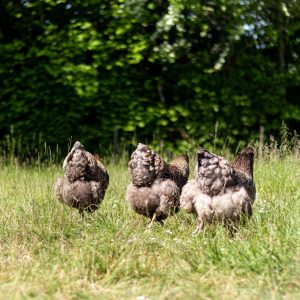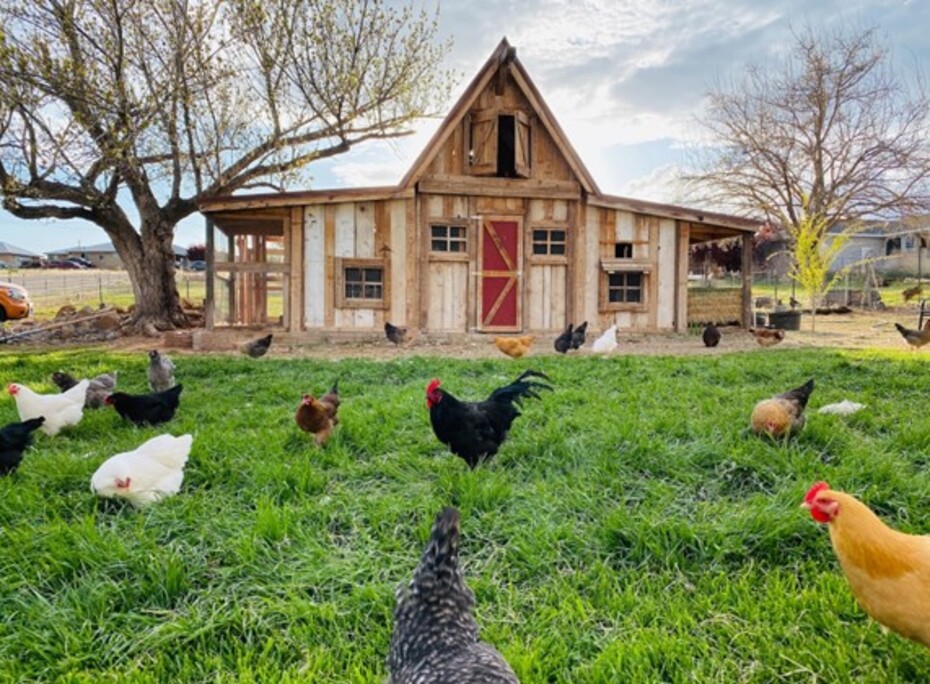A backyard flock offers multiple benefits. It can be a food source for the family and an income-generating project at the same time. If you have a garden, raising chickens means healthy soil and having plants that are pest-free. But pests are resilient, and there are those that can wreak havoc on your roosters and hens. This article digs deep into what these pests are and how you can keep pest free backyard.
Understanding the Common Pests
When creating a pest-free haven for your backyard flock, it’s crucial to be well-versed in the common pests that can affect them. Let’s delve into these unwelcome visitors and the potential issues they bring.
Flies
These buzzing insects not only annoy your chickens but can also transmit diseases. Flies are attracted to manure and food scraps, making your coop an enticing spot for them.
Mosquitoes
Tiny but pesky, mosquitoes can also transmit diseases like the West Nile virus to both chickens and humans. Stagnant water sources can be breeding grounds for mosquitoes.
Mites and Lice
These tiny arthropods can infest your chickens’ feathers and skin, causing itching, feather loss, and stress. Regular coop cleaning and dust baths can help prevent infestations.
Rodents
Rats and mice are notorious for pilfering chicken feed and eggs. Besides being a nuisance, they can spread diseases like salmonella.
Understanding these common pests and the health risks they pose is the first step in creating a pest-free environment for your backyard flock.
Tip 1: Plan and Execute Proper Coop Design and Maintenance
A well-designed coop is the cornerstone of a pest-free haven for your backyard flock. Its significance extends beyond shelter. It directly influences your chickens’ health and happiness. Here are essential tips for maintaining a coop that keeps pests at bay:
Ventilation: Adequate airflow is crucial. Properly designed vents promote fresh air circulation, reducing moisture buildup that attracts pests. Ensure vents have screens to keep out unwanted intruders.
Flooring choices: Select flooring that’s easy to clean and disinfect. Consider using materials like linoleum or concrete, as they discourage pests and simplify cleaning.
Nest box maintenance: Regularly inspect and clean nesting boxes for your chickens. This prevents mites and other pests from taking residence. Provide fresh bedding to keep your hens comfortable.
Regular cleaning routines: Establish a consistent cleaning schedule. Remove droppings, replace bedding, and scrub surfaces. This prevents odors that might attract pests and keeps your coop a safe, pest-free sanctuary for your cherished cluckers.
By focusing on proper coop design and maintenance, you’ll create a welcoming and secure environment where your backyard flock can thrive.
Tip 2: Do Regular Cleaning and Sanitization
Cleanliness is your first line of defense against pests in your poultry’s home environment. It ensures your feathered friends are safe from disease-carrying critters and promotes their overall well-being. To achieve this, here’s a cleaning guide to keep your coops clean and sanitized:
Have a regular cleaning schedule: Aim for a thorough cleaning at least twice a year. Regular spot cleaning can prevent pest problems from taking root.
Have all your tools on hand: Gather your cleaning supplies, including a sturdy rake, a shovel, a bucket of soapy water, and a stiff brush.
Remove waste: Start by removing all old bedding, droppings, and uneaten food from the coop, nesting boxes, and feeders.
Scrub and disinfect: Scrub the surfaces with the soapy water mixture and a brush, ensuring you reach all nooks and crannies.
Rinse and dry: Rinse everything thoroughly with clean water and let it air dry in the sun.

Tip 3: Aim for Effective Waste Management
When creating a pest-free haven for your backyard flock, effective waste management plays a crucial role. Let’s dive into how proper waste management can keep your coop clean and help control pesky pests.
The Role of Waste Management in Pest Control
Waste from your chickens can attract unwanted pests like flies and rodents. When left alone, it can quickly transform into an area where fleas congregate and are most active.
Prompt waste disposal eliminates these temptations for pests. Regularly cleaning the coop, removing soiled bedding, and keeping the area around the coop clean are essential steps in this process. Remember, a clean coop is a less inviting place for pests to call home.
Composting: A Method for Effective Manure Management
Composting is a fantastic method for managing chicken manure. It not only reduces waste but also transforms it into nutrient-rich fertilizer for your garden. By composting manure properly, you’re turning a potential problem into a valuable resource. Follow composting guidelines to ensure safe and efficient decomposition.
Incorporating these waste management practices into your backyard flock routine will help you maintain a pest-free and healthy environment for your feathered friends.
Tip 4: Implement Proper Feeding Practices
Feeding your backyard flock isn’t just about nourishing your feathered friends. It’s also a vital tool in your battle against pesky invaders. Here, we’ll delve into two essential aspects of feeding that can help you maintain a pest-free haven for your chickens.
Deter Pests through Proper Feeding
Proper feeding practices play a significant role in pest prevention. Ensure your chickens receive balanced, nutritionally rich feed. This keeps them healthy, reducing the chances of pests being attracted to weakened birds. Regularly clean up spilled feed to deny pests an easy meal, and opt for feeders designed to minimize waste.
Store and Dispense Feed Wisely
Preventing feed contamination is equally crucial. Store chicken feed in secure, airtight containers to thwart rodents and insects. Dispense feed in clean, dry areas using feeders raised off the ground. This discourages pests from accessing the food source. Regularly clean feeders and remove any damp or moldy feed to maintain a hygienic environment.
Tip 5: Use Natural Pest Control Methods
Proper feeding practices can play a significant role in keeping those bothersome pests at bay. Here’s how you can achieve it:
Balanced diet: Ensure your chickens receive a well-balanced diet rich in essential nutrients. A healthy, well-fed flock is better equipped to resist pests and diseases. High-quality commercial feeds or custom-blended options can help maintain their overall health.
Treat monitoring: While treats are fun for your chickens, excessive indulgence can disrupt their balanced diet and attract pests. Limit treats to small amounts and opt for healthy options like vegetables or grains.
Feeding area sanitation: Regularly clean and sanitize your chicken’s feeding area. Leftover food scraps can attract rodents and insects. Keep their feeding area tidy to discourage pests from setting up shop.

Tip 6: Invest in Pest-Resistant Landscaping
Make use of smart landscaping choices that naturally deter unwanted critters. By embracing these tactics, you’ll maintain a healthier and happier environment for your feathered friends.
Smart Plant Selection
Opt for pest-resistant plants in your backyard. Consider herbs like lavender, mint, or rosemary, which not only enhance your coop’s ambiance but also keep pests at bay. Marigolds and nasturtiums not only add color but serve as natural pest repellents, too.
Vegetation Management
Keep dense vegetation at a distance from your coop. Dense greenery can become hiding spots for rodents and insects. Regularly trim and clear the area around the coop to minimize hiding spots for pests, ensuring your chickens remain safe and healthy.
Tip 7: Practice Consistent Health Monitoring
Ensuring your backyard flock remains happy and pest-free is a top priority. Regular health checks for your feathered friends are key to achieving this goal. Here’s a simple checklist to help you spot any signs of pest infestations or diseases early on:
Observation: Spend time observing your chickens. Healthy birds are active, alert, and social. Any sudden changes in behavior, such as lethargy or isolation, may be cause for concern.
Feather condition: Check the quality of their feathers. Glossy, well-groomed plumage is a sign of good health. Dull, ruffled feathers can indicate stress or illness.
Eyes and nostrils: Clear, bright eyes and clean nostrils are signs of a healthy bird. Watery eyes, discharge, or sneezing could be early signs of respiratory issues.
Appetite and water intake: Monitor their food and water consumption. A decrease in appetite or excessive thirst may indicate underlying health problems.
Droppings: Regularly inspect their droppings. Healthy droppings should be firm and brown. Any drastic changes in color, consistency, or the presence of blood should be investigated.

Tip 8: Quarantine New Additions
One crucial step often overlooked is quarantining new additions. This practice is not just a precaution. It’s a necessity to ensure the health and safety of your existing chickens and the longevity of your coop.
Introducing new chickens or equipment without quarantine can expose your entire flock to potential diseases and pests. Quarantine provides a buffer period to identify and address any health issues in newcomers before they mingle with your established birds. This simple step can prevent costly outbreaks and the need for extensive treatments down the road.
How to Quarantine
The quarantine process involves housing new chickens separately for at least two to four weeks. Regular health checks and observations should be conducted during this period. It’s vital to keep separate feeding and cleaning equipment to minimize the risk of cross-contamination.
Regularly check for signs of illness, like lethargy, sneezing, or unusual droppings. Lastly, consult a veterinarian for a health assessment and advice on appropriate vaccinations.
Tip 9: Chemical Pest Control as a Last Resort
When safeguarding your backyard flock, chemical pest control should be your final option.
Chemical pesticides can pose serious risks to your feathered friends. These substances might inadvertently harm your chickens, contaminate their food and water sources, or leave toxic residues in their environment. Constant exposure to chemicals can contribute to resistance to pests, making them even harder to control over time.
Only resort to chemical pest control when all else fails. Prioritize preventive measures, like maintaining clean coops, regular inspections, and natural remedies mentioned in our previous tips.
If you must use chemicals, opt for poultry-safe products, strictly following label instructions. Isolate your chickens during treatment, keeping them away from treated areas. Monitor them closely for any signs of distress.
Remember, the health of your backyard flock comes first. Reserve chemical pest control for those rare situations where no other option remains.
Get Started On Raising Your Own Backyard Flock
By following these nine tips for creating a pest-free paradise for your backyard flock, you can guarantee a healthier and happier home for your feathered friends. Proper sanitation, coop maintenance, and feeding practices are essential in promoting their well-being and ensuring a pest-free environment that will keep your chickens clucking happily.
Conducting routine health checks and promptly addressing any concerns contributes to creating a safe haven for your beloved backyard flock. This ultimately allows you to enjoy the rewards of caring for these delightful creatures to the fullest.

